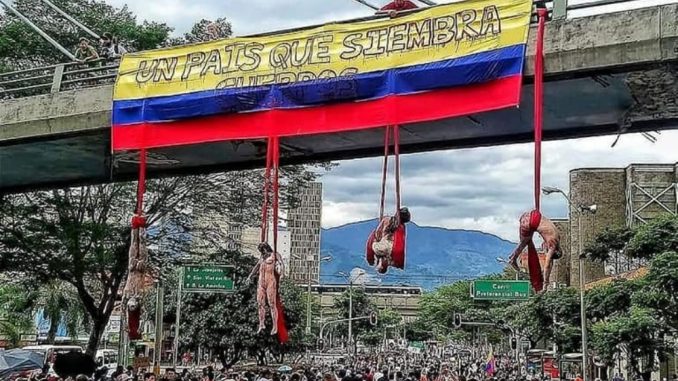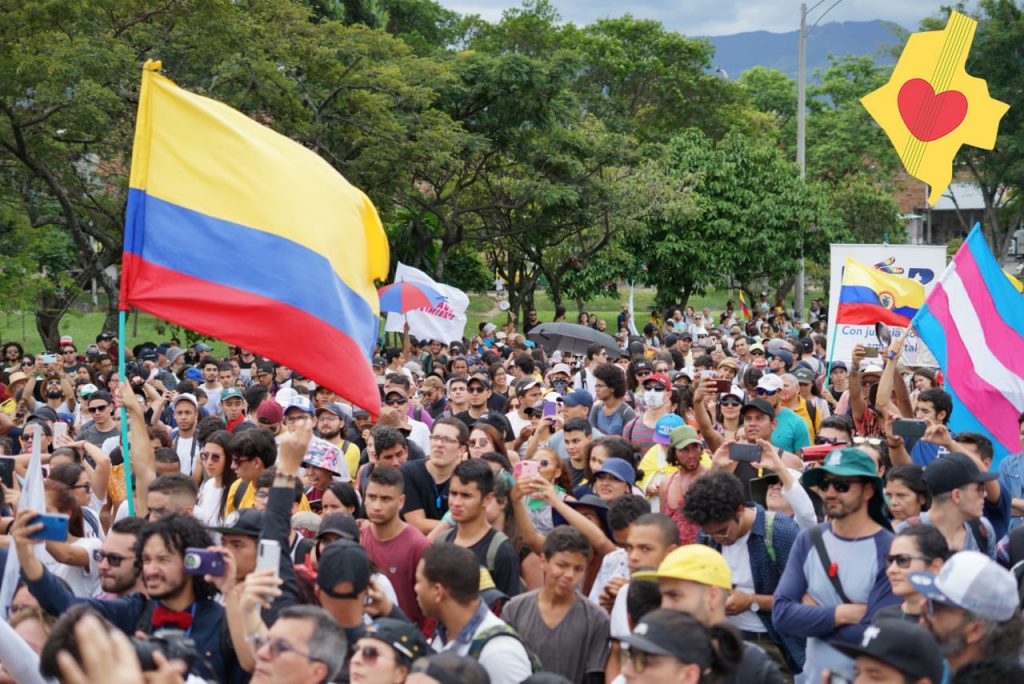
By Impulso Colectivo – International Socialist League.
On December 21, 2019, a month-long national strike came to a close in our country, leaving abundant political material to analyze. The process has revealed an awakening of people’s conscience, the advance of the youth and feminist movements, product of years of accumulation of struggle. At the same time, it also allows us to see in practice what Trotsky called the crisis of revolutionary leadership. The lack of awareness of the narrowness of political activity and the primitive level of organization are themselves diseases of the leaderships of today´s social movement. The growth of the social movement has surpassed the development of current organizations. Their lack of political, theoretical and practical preparation, have led them to underestimate the masses by reducing the scope of any struggle to conciliation with right-wing governments.The patriarchal capitalist system is in its stage of decline, but to bury this agonized society it is necessary to develop its gravedigger, the organization of the proletariat. However, for the development of the revolutionary leadership, it becomes necessary to analyze the political conditions of the bourgeois government of our country and unmask the leadership of the current social movement, denounce its functionalism to the system, its bureaucratization and how they abandoned the interests of the working class and oppressed sectors, since their actions have limited the capacity of the social movement to fight against the government and reduced its political tasks to immediate demands.
The patriarchal capitalist system is in its stage of decline, but to bury this agonized society it is necessary to develop its gravedigger, the organization of the proletariat. However, for the development of the revolutionary leadership, it becomes necessary to analyze the political conditions of the bourgeois government of our country and unmask the leadership of the current social movement, denounce its functionalism to the system, its bureaucratization and how they abandoned the interests of the working class and oppressed sectors, since their actions have limited the capacity of the social movement to fight against the government and reduced its political tasks to immediate demands.
Duque Rules for the Rich and the IMF
The paramilitary and right-wing government of Iván Duque is under a triple pressure. The capitalist crisis looming at the end of 2020, driven by growing public and private debt that currently stands at 226% of world GDP, troubles multilateral organizations like the IMF, the World Bank, the OECD and has them designing austerity plans for governments to guarantee payment of debts. The Colombian bourgeoisie does not want to pay its part, pushing for tax exemptions and low wages. Finally, the common people are in the streets demanding rights. This panorama places the central government in a dilemma: prioritize the interests of the IMF and the national bourgeoisie or guarantee social rights for the majority.
It is more than evident which course the current government chose, the class interests it represents are manifest in the allocation of 11% of the nation’s resources to pay interests on the public debt, the creation of a financial holding that progressively privatizes state companies, the so-called Arias law, labor reform, labor flexibility through part-time work and pension contributions per hour, reduction of corporate taxes by more than 9 billion and increase of taxes for middle and low classes (tax reform). These policies, approved within the framework of a national strike, with the level of disapproval towards Duque of 70% and towards the main reference of the right Álvaro Uribe Vélez of 69%. The JEP discovery of mass graves related to false positives in Dabeiba Antioquia shows that, despite the fracture between the bourgeoisie, thanks to its economic, political and military power, when unity is required, they find it.
The National Strike Committee delays the progress of the Colombian social movement
But is the Colombian bourgeoisie invincible? What happened to the left? As we outlined above, the Colombian people decided not stand the abuse any longer and took to the streets to demand changes. In this path of struggle, the people have had to face an indolent government that is dismissive of the country’s problems. At the same time, the self-proclaimed leadership of the social movement, the National Strike Committee, opted for the path of conciliation, seeking to solve with the oppressors the disasters they have caused. This tendency, to solve the popular uprisings by negotiating with the bourgeoisie, has become the main tool of leaders of the country´s movements, yielding in the class struggle, putting the movement on the defensive, when it had showed great strength from the first day.
This phenomenon of conciliation is one of the multiple symptoms of the disease that affects the left leadership in our country, primitivism. In the last 30 years, the fight against capitalism in Colombia has been moving to the terrain of the economic struggle, without a clear political line and of a short-term and spontaneous character. The revolutionary projects gradually abandoned the fight against capitalism. The process of bureaucratization and redefinition of programs began in the political parties until they reached the unions, peasant organizations, students, among others, consolidating a line of petty-bourgeois character. Today we see how each social upheaval, having reformist and bureaucratic leaderships, ends up being reduced to scenarios of negotiation with the bourgeoisie, signing agreements that appease the nascent movement and prevent its organization. This is then justified by what have called “early victories”.
This disease of primitivism is reflected in the lack of an alternative national project, collecting the interests of the social sectors. The National Strike Committee crystallizes the historical vices of the left, a process that underestimates the capacity of the social movement, unable to promote a real struggle, in search of a fundamental solution to the problems that afflict society. Its fear of confronting the country´s bourgeoisie prevents the social movement from taking qualitative leaps, acquiring class consciousness and organizing in favor of the revolution. Therefore, our task in this process of social uprising, is to break with these false leaders, who will have us negotiate to benefit the bourgeoisie, playing into their interests when the task at hand is to confront it in the streets.
For a real indefinite strike against the Duque government and the IMF, demanding a free and sovereign constituent assembly
The historical mobilizations of this last month have shown that the people want change. Even so, it lacks strength because the sectors on strike have no influence on the production and distribution of capital. The absence of workers, especially of the transport sector, and the lower layers of the peasantry, has prevented real pressure from building against the bourgeoisie and the Duque government. Despite the absence of such fundamental sectors, the people on the streets have shown sufficient strength to overthrow the Duque government. Therefore, the National Strike Committee´s call to negotiate without consolidating a real measure, weakens the struggle that is expressed in the streets.
The real measure we are talking about is the guarantee of a strike by the workers’ centrals and unions that participate in and lead the National Strike Committee. Aware of the neoliberal reforms being approved in Congress and of the people´s mobilizations taking the streets in defense of their demands, they still refuse to call for a real indefinite strike. We demand a real strike with mobilization to stop the neoliberal offensive, repeal the reforms that have been approved and throw Duque out. In that sense, we must aim for a democratic solution in which decisions are not in the hands of the parties of the regime and Uribism, together with the bankers and businessmen, but the working people. That democratic solution is only possible with a free and sovereign National Constituent Assembly, as a tool to pave the way to a workers and peasants government.
In order to appeal to the democratic measure of the Constituent Assembly, our task must not only be reduced to take to the streets to ask for the Duque’s resignation, but to allocate sufficient forces to enable the consolidation of democratic structures in each territory, municipality, city and department and thus be able on the one hand, to articulate the fight against the paramilitary government and the bureaucracy of the leftist leaderships and on the other, to ensure that it is the working class and oppressed sectors that make the decisions and thus, orienting from below a space that represents and catalyzes the true interests of those fighting in the streets. Next year will be a year of bitter struggles, our victories will depend on the direction we take: we sit down to negotiate and plead to the oppressors or we take to the streets to win what belongs to us with the struggle.
“Let the ruling classes tremble at a Communistic revolution. The proletarians have nothing to lose but their chains. They have a world to win.”
Karl Marx.









